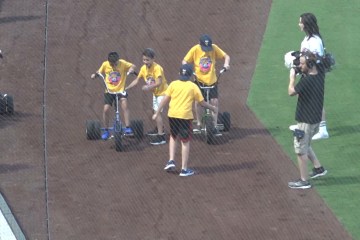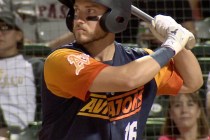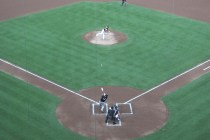Know the code: Baseball’s unwritten rules
A bench-clearing brawl between the Diamondbacks and Dodgers on June 11 was essentially caused by different interpretations of baseball’s set of unwritten rules — which, ironically, have been written in several books, including the 2010 tome “The Baseball Codes.”
“Bob Brenly (former player and manager) said it in one sentence: Have respect for the game, have respect for your opponents and have respect for your teammates,” said Michael Duca, co-author of “The Baseball Codes.”
The stage was set for the aforementioned brawl by the unwritten rule that if you intentionally hit one of our guys, we’ll hit one of yours.
Arizona starter Ian Kennedy hit Los Angeles sensation Yasiel Puig with a pitch that deflected off his shoulder and grazed his nose, a clear violation that called for retaliation by Dodgers starter Zack Greinke.
However, a gray area arose when Greinke needed four attempts before he finally plunked Diamondbacks catcher Miguel Montero with a pitch.
Arizona thought this was a violation — you get only one shot at retaliation, according to the unwritten rule — which is why Kennedy drilled Greinke in the shoulder in the next half-inning.
Los Angeles had considered the case closed when Montero was hit by a pitch, so it became enraged when Arizona continued the hostilities with a high and inside pitch aimed at Greinke’s head, another violation that caused the benches to clear.
“There are a lot of misunderstood things in the (unwritten) rules,” said Duca, an official scorer for the San Francisco Giants and Oakland Athletics. “People seem to think if you feel retaliation is acceptable, that you must be some type of bloodthirsty headhunter, but that’s not true.
“Retaliations are not done above the shoulders. When they’re done above the shoulders, that in itself is an unwritten rule.”
51s manager Wally Backman agrees the common theme of the unwritten rules is respect.
“Pretty much, just don’t show your opponent up,” Backman said. “When you start showing the opponent up, that’s not good baseball.”
As such, Duca said the most common unwritten rule is don’t run up the score late in the game.
“But the definition of a big lead and the definition of late have changed a lot,” he said. “Back in (manager) Sparky Anderson’s day, it was a five-run lead after six innings and he’d shut down the running game. His feeling was if you can’t preserve a five-run lead with your bullpen, you don’t deserve to win the game.
“Now it’s gotten to the point where it’s a six-run lead after seven, especially in American League ballparks, where no lead is safe.”
Backman abides by the unwritten rule that you don’t steal when you have a large, late lead.
“If I’ve got a five- or six-run lead after seven innings, I’m not going to run. I pretty much shut it down,” he said. “I think that goes for most guys. If you don’t have a bullpen to hold a six-run lead, you’re in trouble.”
Other rules regarding showing up opponents include don’t admire a home run — flipping the bat is a definite no-no — don’t run across the pitcher’s mound and don’t bunt to break up a no-hitter.
In one of the most egregious violations of baseball’s code, former 51s catcher Ben Davis bunted for a base hit with one out in the eighth inning to spoil Curt Schilling’s bid for a perfect game in Arizona’s 3-1 win over the San Diego Padres on May 26, 2001.
Duca spoke with Brenly, the Diamondbacks’ manager at the time, about the infraction.
“What upset him so much was not that a bunt broke up the perfect game, but that it was the only time Ben Davis bunted for a hit in his entire career,” Duca said.
Backman said he wouldn’t fault a player for bunting to break up a no-hitter unless — as was the case with Davis — it wasn’t a regular part of the player’s game.
“If it’s part of your arsenal as a player, you should not take that part of your game away just because someone’s throwing a no-hitter,” he said.
As for running across the pitcher’s mound, Backman said while he’s never done it, he’s also never heard of that rule.
Neither, apparently, had Yankees third baseman Alex Rodriguez until April 22, 2010, when he ran across the mound on his way back to first after a foul ball and A’s pitcher Dallas Braden became irate, shouting, “That’s my mound.”
Asked about it after the game, A-Rod said he thought it was funny, that he’d never heard of that rule, “especially from a guy who has a handful of wins in his career.”
A couple of weeks later, on Mother’s Day, Braden pitched a perfect game.
Other unwritten rules include never make the first or third out at third base; concede everything to the center fielder; play for the win on the road and a tie at home; if you play for one run, that’s all you’ll get; never give up a home run on an 0-2 count; don’t go against the percentages; pitchers shouldn’t show up their fielders; don’t rub the spot after a hit by pitch; don’t play the infield in early in the game; and don’t steal the catcher’s signs from second base.
“Anyway you can get an advantage, I’m all for it — as long as you’re not relaying signs from second base to the hitter, because that gets people hurt, too,” Backman said. “If they get caught, they better stop. If they don’t stop, you start hitting guys.”
To avoid an ejection, Backman said an unwritten rule regarding umpires is to never use the word “you.”
“You can go out and argue, but if you say ‘you suck’ or ‘you’ whatever, you’re gone,” he said.
An unwritten rule for the media is to never talk to a pitcher on the day of his start, and a rule often ignored by the media is to never mention a no-hitter while it’s in progress.
A pitcher’s teammates and coaches always adhere to this rule, to the point where they’ll leave the pitcher alone in a corner of the dugout while perfection is still within reach.
Two fun-loving pitchers — Bert Blyleven and David Wells — each broke this unwritten rule during their own bids for a no-hitter and perfect game.
Working on a no-no through seven innings for the Rangers against the Angels in Anaheim, Calif., in 1977, Blyleven stunned Jim Sundberg, his catcher, when he sat next to him in the dugout and said, “Hey, Jimmy, you know we’ve got a no-hitter going?” Sundberg was speechless and, after trying in vain for a proper response, walked away in silence. Despite the violation, Blyleven finished the no-hitter.
With Wells’ Yankees teammates avoiding him in the dugout during his 1998 perfect game, “Boomer” approached fellow pitcher David Cone and said, “Can you believe what’s going on here?”
Trying to keep him loose, Cone dared Wells to break out his knuckleball, and after a perfect eighth inning, he told him, “You showed me nothing. You didn’t use your knuckleball.”
Wells didn’t need the knuckler, but Cone’s sense of humor might have helped him complete his perfect game.
With more fraternization among players these days, Duca said the code is fading.
“As much as anything else, because a lot of these guys played with each other on traveling teams or knew each other in college or have the same agent or do the same offseason charity stuff,” he said. “It becomes more and more difficult to see opponents as enemies.”
Backman begs to differ, saying baseball’s set of unwritten rules is still an integral part of the game.
“The game’s not going to change,” he said. “The personnel changes.”
Contact reporter Todd Dewey at tdewey@reviewjournal.com or 702-383-0354.
























